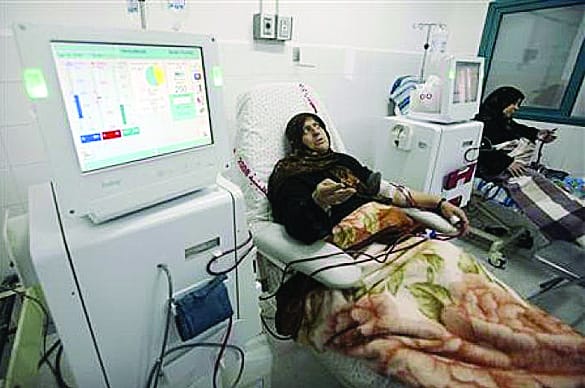The abuse of sympathy
Gilead Amit and the abuse of sympathy

This has been a busy week on campus. Imperial Christian Union have been hosting their free thinking week, and the Palestinian Society have organised a Gaza awareness week. And being a conscientious, participating member of the Union, I've tried to get involved with all these conflicting activities as best I can. I came to some of the Christian Union events, ready for an argument and the free doughnuts, with my fists clenched and my cheeks turned. I even went to some of my lectures.
But I haven't gotten involved with Gaza awareness week, even though it's a subject closer to my heart than Richard Dawkins or even the Foundations of Quantum Mechanics. And the reason for my silence is there hasn't been anything for me to say. One year ago, hundreds of people were dying in a horrendous and avoidable war. Thousands of others suffered and the cause of peace has been irreparably harmed. There should be time to grieve.
But grief cannot be isolated. Tragedy does not occur in a vacuum. We must learn from horror and atrocity, and do our utmost to ensure it is never repeated. And when it comes to the Middle East, I think the world is learning the wrong lessons.
Israel is far from irreproachable. It makes political, strategic and humanitarian mistakes, and in my opinion it needs to accept its share of the responsibility. But when we discuss the human rights situation in Gaza, we need to direct our criticism appropriately, and not be blinded to the central issues at hand. Sympathy with suffering, and indeed even suffering itself, are not certificates that guarantee one is telling the truth. One must try to look beyond emotions and beyond the feelings of sorrow we automatically and instinctively extend to those who have been abused.
Those who style themselves as pro-Palestinian speak very eloquently, and in great detail, of the human rights violations Israel inflicts upon the residents of Gaza. We constantly hear how the Gazan population must endure Israeli security checkpoints and searches, Israeli blockades on necessary goods and services, and the constant threat of Israeli bombardment.
We rarely hear of the ongoing feuds between adherents of Hamas and followers of Fatah, feuds which in the duration of Operation Cast Lead alone killed dozens and wounded many more. We are seldom told of the plight of the Palestinian families who wait in terror lest militants commandeer their property or use their children as human shields to protect themselves from Israeli reprisals. Few stories reach us of the Palestinians whose buildings explode when a next-door neighbour makes a mistake in calibrating an explosive device; a device intended for detonation among Israeli schoolchildren.
Over the past twenty seven years, over 6 billion dollars in aid have been poured into Gaza and the West Bank. Even during the Gaza war, Israel imported thousands of tons of medical supplies, fuel and grain into Gaza. Even when the ceasefires convoked to allow the safe passage of medical supplies were broken by Hamas militants. Even when aid lorries and ambulances were hijacked and hospitals used as safe zones by gunmen. Even when the tunnels leading out of Gaza were used to import weapons and explosives instead of medicine and food. The total aid received by the Gazan population is over five times as much per capita as post-war Europe received under the Marshall Plan. And the Palestinians need it. They deserve enough money to build the finest schools, maintain the most advanced hospitals, and develop a flourishing Palestinian economy.
So why hasn't this happened? Why, in the years since Israel pulled its settlers out of every square inch of Gaza, has the region not developed the best schools in the Middle East? Why are there no hospitals in Gaza to rival those across the border in Israel? Why have gardens left behind by the Israelis not been urged to give fruit to new masters?
The simple and depressing answer is that munitions are expensive. One cannot build up an arsenal of rockets and explosives while at the same time improving the education of one's children. If the choice is guns or better living, we know from experience which way the Palestinian leadership always swings.
And why should they choose any differently? The less well-educated their people's children are, the easier it will be to fill their heads with extremist, anti-Israeli dogma. The fewer hospitals are functional, the more obvious it will be to all in the sensitive, caring West that the Israelis are irredeemably in the wrong.
There are thousands upon thousands of innocent Palestinians whose suffering is so great as to make description impotent. But they have been callously, cynically and relentlessly abused at the hands of their supposed leaders. But if the self-proclaimed Palestinian advocates are to be believed, it is the sole responsibility of the Israelis to ensure the well-being of those living in Gaza. Their suffering is Israel's failing.
But why? Gaza does not only share a border with Israel; it shares one almost a fifth as long with Egypt: another Arabic-speaking, Muslim region. Surely, then, the assistance across that border must exceed anything received from Israel? Surely the welcome received at the Egyptian border is one of sympathy and even brotherhood?
One need only look at the way in which ethnic Palestinians have been treated in Egypt, Jordan and Lebanon to get an understanding of how the Arab world regards the people of Palestine. It is all too easily forgotten that areas of Gaza were under Egyptian control for nearly 19 years, during which time the Palestinians were subjected to brutal oppression and appalling conditions in the refugee camps were allowed to perpetuate. If only the flow of genuine assistance were as bountiful as the flow of anti-Israeli rhetoric. At least, then, people would not be dying for the sake of hypocrisy.
The systematic abuse of the Palestinians by their leadership and the rest of the Arab world has to end, and this can only be achieved by removing the joker from the pack. The instinctive, ritualised demonisation of Israel must cease, or else the motivation to provide aid to the suffering will drop, and the manipulation of the weak will continue.









